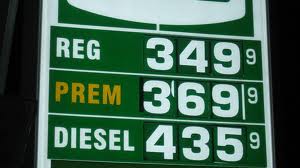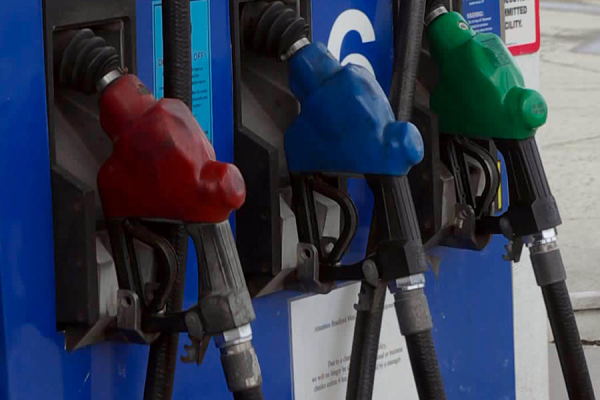Ask The Mechanic: Carburetor vs Fuel Injection
James Dunst, Bell Performance's ASE-certified master mechanic, discussed mechanical issues with your engine in this guest blog.

 As of October 2013, gas prices seem to be on their way down in another one of those price swings that we seem to experience with regularity. It's pretty normal for gas prices to go up and down by quite a few cents within a short period of time. If you look at how gas prices have trended over the last three years or so since late 2010, what you see is that we are now just slightly below what the average price tends to be for that time period.
As of October 2013, gas prices seem to be on their way down in another one of those price swings that we seem to experience with regularity. It's pretty normal for gas prices to go up and down by quite a few cents within a short period of time. If you look at how gas prices have trended over the last three years or so since late 2010, what you see is that we are now just slightly below what the average price tends to be for that time period.
Gas prices are kind of a black box to most people - something that you know works, but you have no idea how it works. We see how much pain we are experiencing at the pump, but we have no real clue what determines those gas prices. And people tend to favor simplistic explanations, so there are any number of black-and-white responses to the question of why gas prices are going up or why gas prices are "" so high". Oil companies are gouging us. Gas stations are greedy. We don't do enough drilling in Alaska.
Let's take a look at some of the things that go into determining how much gas costs. Let's try to answer the question "how do gas prices work"? This subject is one that we could write pages and pages on, but since this is a blog post, not a thesis, we will try to boil it down as much as possible.
The biggest thing that affects gas prices are the laws of supply and demand. That's not an answer that conspiracy theorists really want to hear about, but unfortunately for them, that's generally how it works. Now there are a few nuances that are appropriate to talk about but that really is the simple answer. When we talk about supply and demand, we are talking about consumer demand and fuel usage, and we are also talking about the availability of crude oil.
Demand goes up when people use more fuel. In the United States, demand for gas increases during the summer when more people are driving and heading out on vacation. You also have heavy driving holidays like Memorial Day and Fourth of July and even Thanksgiving which create higher demand and higher gas prices. So this is part of the demand side of the equation.
On the supply side, you've got the transition from winter fuel to summer fuel in the early spring; that contributes to gas prices starting to rise at that time – because the refineries have to take time to switch their production over and this limits their amount of fuel produced that is then available on the open market.
The world crude oil market also influences gas prices because inventories of crude oil do not stay the same all the time. Various factors will increase inventories or lower inventories, and that affects the price of gasoline all around the world.
If you live in California or Chicago, you pay a lot more for gas than someone in Texas or Louisiana does. Some of that has to do with the Gulf States being closer to the production points, lowering the costs of getting the fuel to them. But you've also got the factor of different areas of the country have different requirements for the formulation of their gasoline. The special "reformulated" gasoline blends place extra requirements on the refineries to produce them and contribute to driving up the cost of the gasoline. California and Milwaukee, especially, are known in the industry as "gasoline market islands", where special requirements for cleaner burning gasolines in these areas are unique only to those areas. This limits the number of refineries that can produce their specialized gasolines. Fewer available places to make it places pressure on the supply side of the equation. And this means prices in California and Milwaukee are going to be higher than in other areas.
What about how gas prices affect the cost of other things in the economy? It doesn't take a genius to realize that gas prices affect transportation costs of consumer goods, which affectthe cost of getting goods to areas of the country. The state of Hawaii has to have many of its consumer products flown in by plane or sailed in on ship. So when aviation fuel and marine fuel prices are high, that cost gets pass along to them to the Hawaiian consumer. For a gallon of milk, a consumer on the mainland could expect to pay, say, $3.69. In Hawaii, you're not going to find it cheaper than $4.99 (and mostly likely you'll pay $7.00 a gallon).
The ethanol issue is another example of this. Into 2013, about 40% of the nation's corn crop was being diverted into production of ethanol fuel to blend into gasoline. Corn is obviously used in many many other things – feeding animals, making high fructose corn syrup for use in packaged food goods, for example. So the cost of all of those things has been rising steadily as more and more corn has been used to produce fuel for our vehicles instead of food.
You may be interested in these other articles

James Dunst, Bell Performance's ASE-certified master mechanic, discussed mechanical issues with your engine in this guest blog.

Did you ever wonder why it is almost impossible to duplicate the EPA city and highway mileage ratings for your vehicle? This rating is usually found...

With United States gas prices so high these days, it's not hard to find gasoline-saving tips on CNN, MSNBC, and Fox News, as well as on Google and...